
Journal Menu
► ▼ Journal Menu-
- Viruses Home
- Aims & Scope
- Editorial Board
- Reviewer Board
- Topical Advisory Panel
- Instructions for Authors
- Special Issues
- Topics
- Sections & Collections
- Article Processing Charge
- Indexing & Archiving
- Editor’s Choice Articles
- Most Cited & Viewed
- Journal Statistics
- Journal History
- Journal Awards
- Society Collaborations
- Conferences
- Editorial Office
Journal Browser
► ▼ Journal BrowserNeed Help?
Announcements
5 July 2024
Viruses | Selected Papers in the Section “Viruses of Plants, Fungi and Protozoa”
1. “Hop Latent Viroid: A Hidden Threat to the Cannabis Industry”
by Charith Raj Adkar-Purushothama, Teruo Sano and Jean-Pierre Perreault
Viruses 2023, 15(3), 681; https://doi.org/10.3390/v15030681
Available online: https://www.mdpi.com/1999-4915/15/3/681
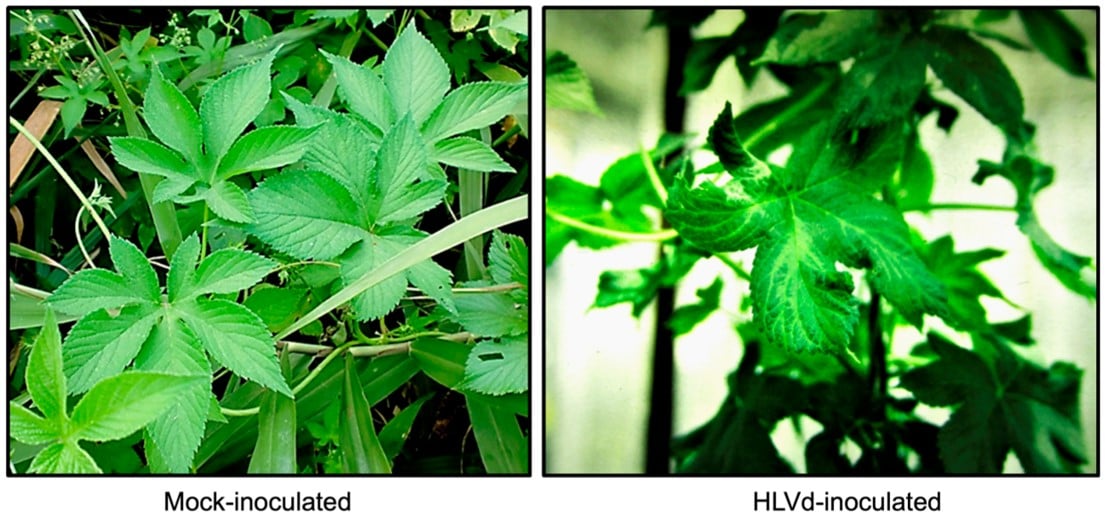
2. “Investigating the Interactions of the Cucumber Mosaic Virus 2b Protein with the Viral 1a Replicase Component and the Cellular RNA Silencing Factor Argonaute 1”
by Sam Crawshaw, Alex M. Murphy, Pamela J. E. Rowling, Daniel Nietlispach, Laura S. Itzhaki and John P. Carr
Viruses 2024, 16(5), 676; https://doi.org/10.3390/v16050676
Available Online: https://www.mdpi.com/1999-4915/16/5/676
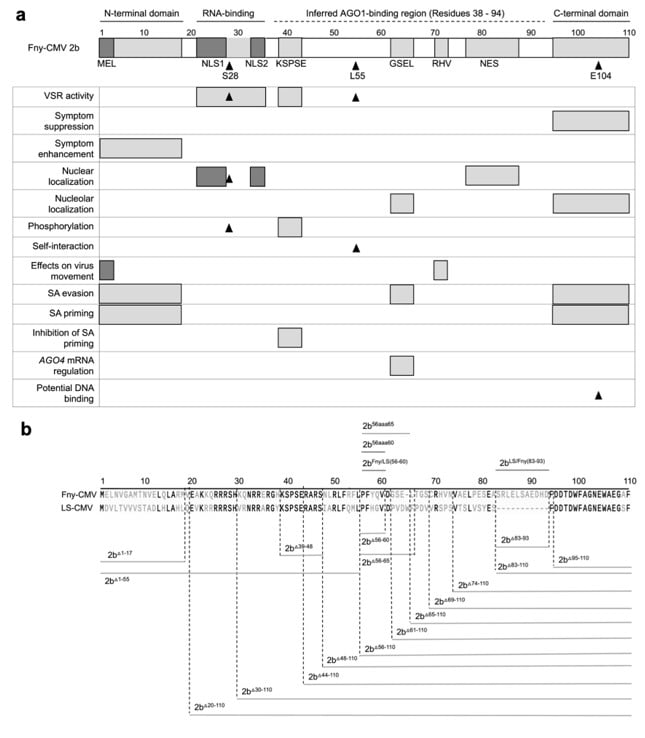
3. “RNAi-Based Antiviral Innate Immunity in Plants”
by Liying Jin, Mengna Chen, Meiqin Xiang and Zhongxin Guo
Viruses 2022, 14(2), 432; https://doi.org/10.3390/v14020432
Available Online: https://www.mdpi.com/1999-4915/14/2/432
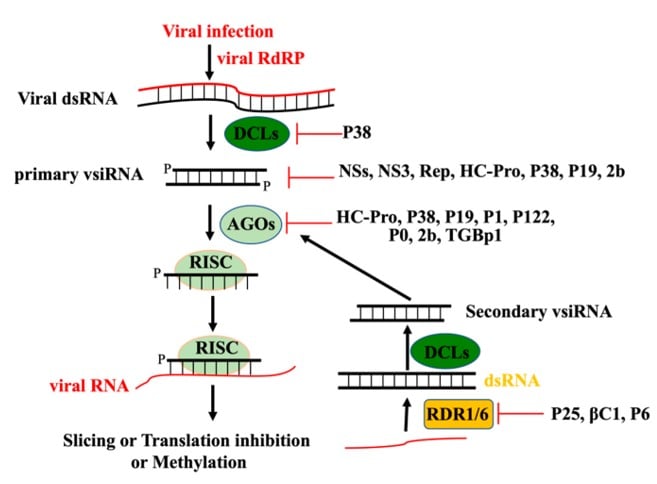
4. “New Insights into Hop Latent Viroid Detection, Infectivity, Host Range, and Transmission”
by Osama O. Atallah, Sherin M. Yassin and Jeanmarie Verchot
Viruses 2024, 16(1), 30; https://doi.org/10.3390/v16010030
Available Online: https://www.mdpi.com/1999-4915/16/1/30
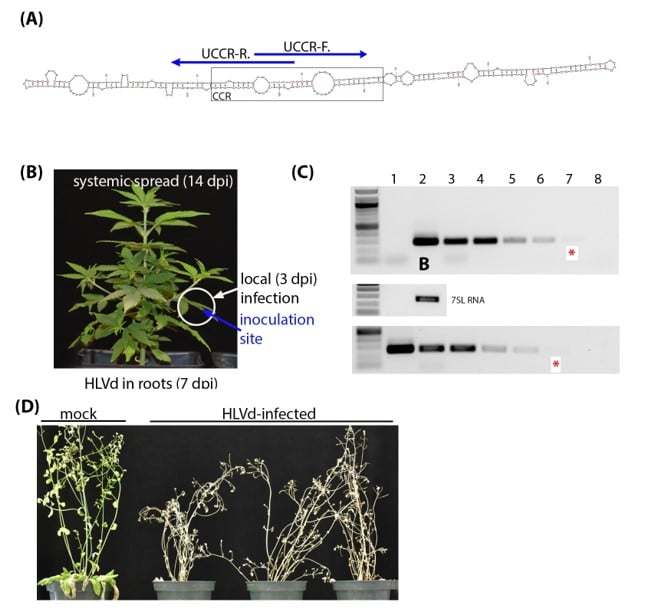
5. “Efficient Purification of Cowpea Chlorotic Mottle Virus by a Novel Peptide Aptamer”
by Georg Tscheuschner, Marco Ponader, Christopher Raab, Prisca S. Weider, Reni Hartfiel, Jan Ole Kaufmann, Jule L. Völzke, Gaby Bosc-Bierne, Carsten Prinz, Timm Schwaar et al.
Viruses 2023, 15(3), 697; https://doi.org/10.3390/v15030697
Available Online: https://www.mdpi.com/1999-4915/15/3/697
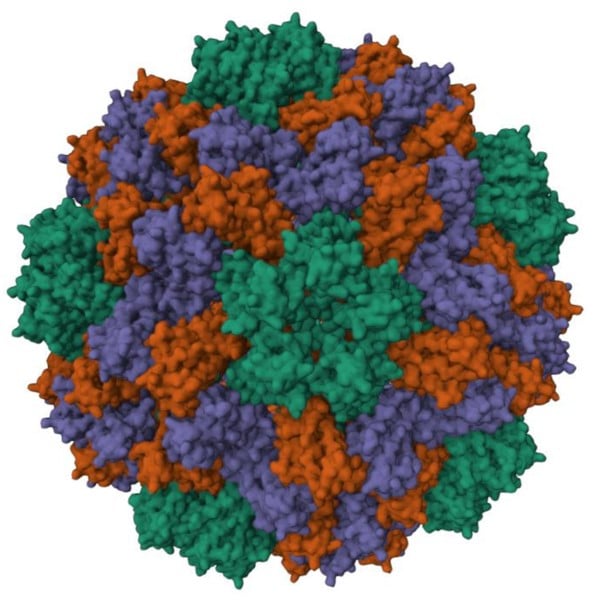
6. “Plant Defense and Viral Counter-Defense during Plant–Geminivirus Interactions”
by Jianhang Zhang, Mengyuan Ma, Yule Liu and Asigul Ismayil
Viruses 2023, 15(2), 510; https://doi.org/10.3390/v15020510
Available Online: https://www.mdpi.com/1999-4915/15/2/510

7. “A Capsid Protein Fragment of a Fusagra-like Virus Found in Carica papaya Latex Interacts with the 50S Ribosomal Protein L17.”
by Marlonni Maurastoni, Tathiana F. Sá Antunes, Emanuel F. M. Abreu, Simone G. Ribeiro, Angela Mehta, Marcio M. Sanches, Wagner Fontes, Elliot W. Kitajima, Fabiano T. Cruz, Alexandre M. C. Santos et al.
Viruses 2023, 15(2), 541; https://doi.org/10.3390/v15020541
Available Online: https://www.mdpi.com/1999-4915/15/2/541
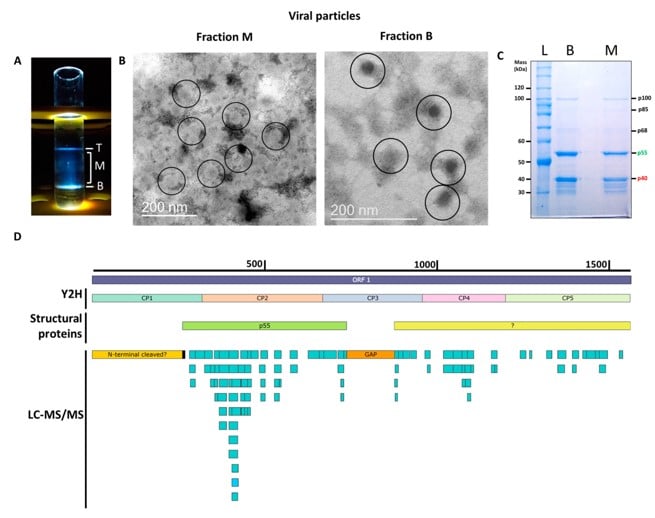
3 July 2024
Viruses Receives an Updated Impact Factor of 3.8
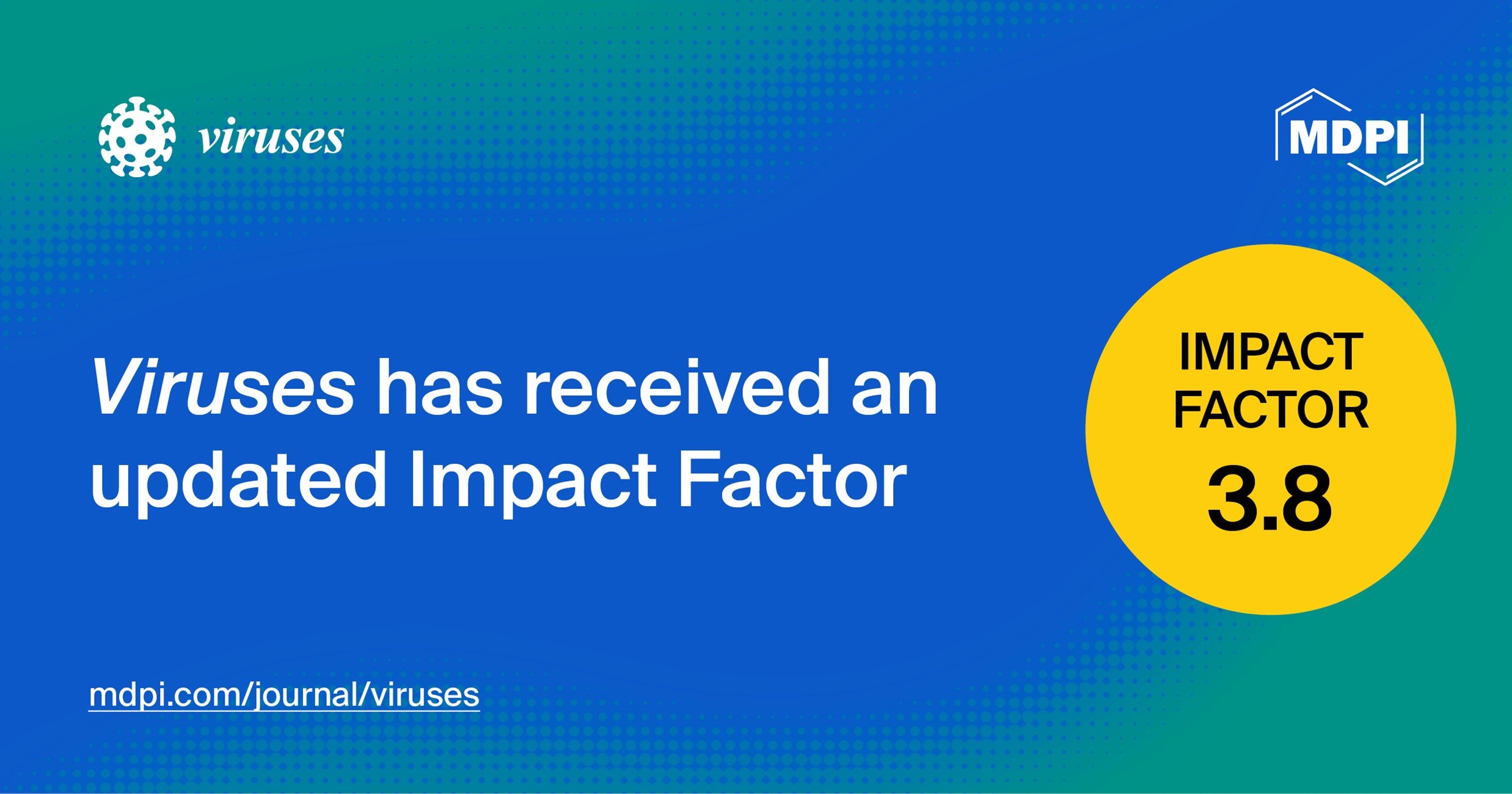
After achieving a new CiteScore of 7.3, placing Viruses (ISSN: 1999-4915) in Q1 in the “Infectious Diseases” category, we would like to share that Viruses also received a new impact factor of 3.8, placing it in Q2 in the “Virology” category according to Journal Citation Reports 2023. Despite a slight drop, likely due to the COVID-19 impact over the previous years, among other factors (in the context of the overall WoS journals), we are steadily improving.
At MDPI, our mission is simple yet powerful: we strive every day to make scientific research freely accessible to everyone, everywhere. With over 3.5 million authors choosing MDPI, we have established ourselves as a key player driving the open access initiative.
Our journals have received over 13 million citations in the Web of Science, making us the most cited open access publisher. With over 800 institutional partners, MDPI continues to demonstrate its dedication to providing reliable and collaborative publishing services.
Viruses Editorial Office
25 June 2024
Interview with Dr. Shuofeng Yuan—Winner of the 2024 Early Career Investigator Award

Dr. Shuofeng Yuan trained as a veterinarian before pursuing his Ph.D. in virology and immunology. He now works as an Assistant Professor in the Department of Microbiology at the University of Hong Kong, China. By focusing on small-molecule and broad-spectrum antivirals that are essential for pandemic preparedness, his career goal is to reveal new targets, strategies, and lead compounds against infectious viral diseases through basic and applied research in the broad field of molecular virology. Dr. Yuan has filed more than 30 patents with novel antivirals for emerging infectious diseases including influenza, Zika, and COVID-19. He has been consistently recognized by Clarivate Analytics’ Essential Science Indicators as a top 1% scholar and global “Highly Cited Researcher” for three consecutive years since 2021. He has published more than 50 first/co-first/corresponding-authored original research articles in leading journals including Nature, Science, and The Lancet. He has received several prestigious research awards, including the Dalton Horizon Prize (The Royal Society of Chemistry, UK) and MIT Technology Review Innovators Under 35 (Asia Pacific).
We would like to congratulate Dr. Shuofeng Yuan on winning the Viruses 2024 Early Career Investigator Award!
The following is a short interview with Dr. Shuofeng Yuan:
- Could you briefly introduce yourself to our readers? What are you currently researching, and why did you choose this research field?
I was enrolled in a veterinary medicine program to study zoonotic diseases while receiving my undergraduate education. I then trained as a virologist with tremendous interaction with clinicians and scientists, shaping my way of thinking from bedside to bench and back. I am now an Assistant Professor at the University of Hong Kong and conduct antiviral research with broad relevance to different virus families. I believe that this is important for pandemic preparedness.
- Which research topics do you think will be of particular interest to the research community in the coming years?
Broad-spectrum antiviral development with the aid of artificial intelligence. This group of therapeutics may have a role in controlling emerging and remerging infectious viral diseases, which is particularly useful during the initial stage of a pandemic when vaccines, therapeutics, and even diagnostics are barely available.
- As a young researcher, what is the biggest challenge you have encountered in your research journey? How did you solve it?
The biggest challenge is to identify an experienced technician and a good lab manager who can help set up a new lab. Seeking mentorship from senior professors is important when coping with such challenges.
- Could you briefly describe the key to a happy laboratory life? Which qualities do you think young researchers need?
The freedom to pursue research topics of interest without too much of a burden on obtaining funding and dealing with human resources. An important quality is to think outside the box and interdisciplinary collaboration.
- As the winner of this award, is there something you would like to express or someone you would like to thank the most?
I would like to thank my mentors and family members for their continuous support and guidance when climbing the ladder.
- Do you have any suggestions for improving the awards?
More promotional activities at international conferences such as ASV, ICAR, etc.
- Do you have any suggestions for the journal Viruses?
(1) Reach out for high-quality research articles.
(2) Increase the number of review articles in each issue.
20 June 2024
2023 Impact Factors for MDPI Journals Released

MDPI is pleased to announce the inclusion of 237 journals in the 2024 release of the Journal Citation Reports (JCR) and share the key results (see above).
This year, journals covered in the Emerging Sources Citation Index (ESCI) received category ranks together with journals in the Science Citation Index Expanded (SCIE) and Social Sciences Citation Index (SSCI). Overall, 139 MDPI journals indexed in ESCI are included in the new unified rankings for the first time.
Enhanced Comparability of Data
According to Clarivate, "the creation of unified category rankings [provides] a simpler and more complete category view for the evaluation of journal performance. [...] The category-first approach simplifies journal performance assessment with a holistic view of all journals in each subject category."
We are thrilled to announce that 72% of our ranked MDPI journals (171 of 237) are above average, in Q1 or Q2. Twenty-nine of our journals received their first Impact Factor this year, accounting for more than 5% of the journals accepted into the Web of Science last year.
MDPI Journals Ranked in JCR
The following data includes all MDPI journals indexed in SCIE, SSCI, ESCI and AHCI.
|
Journal |
Impact Factor |
Rank Quartile |
Category |
|
Q3 |
Acoustics |
||
|
Q2 |
Engineering, Mechanical |
||
|
Q2 |
Instruments & Instrumentation |
||
|
Q2 |
Management |
||
|
Q3 |
Respiratory System |
||
|
Q2 |
Engineering, Aerospace |
||
|
Q1 |
Agronomy |
||
|
Q2 |
Agricultural Engineering |
||
|
Q1 |
Agronomy |
||
|
Q1 |
Plant Sciences |
||
|
Q2 |
Computer Science, Artificial Intelligence |
||
|
Q2 |
Computer Science, Interdisciplinary Applications |
||
|
Q3 |
Computer Science, Artificial Intelligence |
||
|
Q2 |
Computer Science, Theory & Methods |
||
|
Q1 |
Agriculture, Dairy & Animal Science |
||
|
Q1 |
Veterinary Sciences |
||
|
Q1 |
Infectious Diseases |
||
|
Q1 |
Pharmacology & Pharmacy |
||
|
Q3 |
Immunology |
||
|
Q1 |
Biochemistry & Molecular Biology |
||
|
Q1 |
Chemistry, Medicinal |
||
|
Q1 |
Food Science & Technology |
||
|
Q2 |
Chemistry, Multidisciplinary |
||
|
Q1 |
Engineering, Multidisciplinary |
||
|
Q3 |
Materials Science, Multidisciplinary |
||
|
Q2 |
Physics, Applied |
||
|
Q2 |
Computer Science, Information Systems |
||
|
Q2 |
Engineering, Electrical & Electronic |
||
|
Q2 |
Telecommunications |
||
|
N/A |
Humanities, Multidisciplinary |
||
|
Q3 |
Environmental Sciences |
||
|
Q3 |
Meteorology & Atmospheric Sciences |
||
|
Q3 |
Physics, Atomic, Molecular & Chemical |
||
|
Q1 |
Audiology & Speech-language Pathology |
||
|
Q1 |
Mathematics, Applied |
||
|
Q2 |
Electrochemistry |
||
|
Q2 |
Energy & Fuels |
||
|
Q2 |
Materials Science, Multidisciplinary |
||
|
Q2 |
Psychology, Multidisciplinary |
||
|
Q2 |
Food Science & Technology |
||
|
Q2 |
Computer Science, Artificial Intelligence |
||
|
Q2 |
Computer Science, Information Systems |
||
|
Q1 |
Computer Science, Theory & Methods |
||
|
Q2 |
Engineering, Biomedical |
||
|
Q1 |
Biology |
||
|
Q2 |
Biochemistry & Molecular Biology |
||
|
Q2 |
Medicine, Research & Experimental |
||
|
Q1 |
Pharmacology & Pharmacy |
||
|
Q1 |
Engineering, Multidisciplinary |
||
|
Q3 |
Materials Science, Biomaterials |
||
|
Q1 |
Biochemistry & Molecular Biology |
||
|
Q1 |
Chemistry, Analytical |
||
|
Q1 |
Instruments & Instrumentation |
||
|
Q2 |
Nanoscience & Nanotechnology |
||
|
Q3 |
Biotechnology & Applied Microbiology |
||
|
Q1 |
Ornithology |
||
|
Q3 |
Neurosciences |
||
|
Q2 |
Construction & Building Technology |
||
|
Q2 |
Engineering, Civil |
||
|
Q2 |
Materials Science, Multidisciplinary |
||
|
Q1 |
Oncology |
||
|
Q4 |
Cardiac & Cardiovascular Systems |
||
|
Q2 |
Chemistry, Physical |
||
|
Q2 |
Cell Biology |
||
|
Q1 |
Materials Science, Ceramics |
||
|
Q3 |
Materials Science, Multidisciplinary |
||
|
Q2 |
Engineering, Chemical |
||
|
Q3 |
Chemistry, Multidisciplinary |
||
|
Q2 |
Chemistry, Analytical |
||
|
Q2 |
Electrochemistry |
||
|
Q1 |
Instruments & Instrumentation |
||
|
Q2 |
Pediatrics |
||
|
Q2 |
Engineering, Environmental |
||
|
Q2 |
Environmental Sciences |
||
|
Q3 |
Green & Sustainable Science & Technology |
||
|
Q2 |
Meteorology & Atmospheric Sciences |
||
|
Q2 |
Medicine, General & Internal |
||
|
Q3 |
Clinical Neurology |
||
|
Q3 |
Neurosciences |
||
|
Q2 |
Materials Science, Coatings & Films |
||
|
Q3 |
Materials Science, Multidisciplinary |
||
|
Q2 |
Physics, Applied |
||
|
Q3 |
Chemistry, Physical |
||
|
Q2 |
Mathematics, Interdisciplinary Applications |
||
|
Q2 |
Computer Science, Interdisciplinary Applications |
||
|
Q3 |
Physics, Condensed Matter |
||
|
Q2 |
Biochemistry & Molecular Biology |
||
|
Q2 |
Dermatology |
||
|
Q3 |
Computer Science, Information Systems |
||
|
Q2 |
Computer Science, Theory & Methods |
||
|
Q2 |
Crystallography |
||
|
Q3 |
Materials Science, Multidisciplinary |
||
|
Q3 |
Biochemistry & Molecular Biology |
||
|
Q2 |
Oncology |
||
|
Q3 |
Computer Science, Information Systems |
||
|
Q2 |
Multidisciplinary Sciences |
||
|
Q2 |
Dentistry, Oral Surgery & Medicine |
||
|
Q3 |
Dermatology |
||
|
Q3 |
Endocrinology & Metabolism |
||
|
Q1 |
Medicine, General & Internal |
||
|
Q2 |
Medicine, Research & Experimental |
||
|
Q2 |
Biodiversity Conservation |
||
|
Q3 |
Ecology |
||
|
Q1 |
Remote Sensing |
||
|
Q3 |
Environmental Sciences |
||
|
Q3 |
Geosciences, Multidisciplinary |
||
|
Q3 |
Ecology |
||
|
Q3 |
Economics |
||
|
Q2 |
Economics |
||
|
Q1 |
Education & Educational Research |
||
|
Q2 |
Computer Science, Information Systems |
||
|
Q2 |
Engineering, Electrical & Electronic |
||
|
Q2 |
Physics, Applied |
||
|
Q3 |
Energy & Fuels |
||
|
Q2 |
Physics, Multidisciplinary |
||
|
Q2 |
Environmental Sciences |
||
|
Q3 |
Genetics & Heredity |
||
|
Q4 |
Critical Care Medicine |
||
|
Q4 |
Dermatology |
||
|
European Journal of Investigation in Health Psychology and Education |
Q1 |
Psychology, Clinical |
|
|
Q2 |
Biotechnology & Applied Microbiology |
||
|
Q2 |
Materials Science, Multidisciplinary |
||
|
Q2 |
Ecology |
||
|
Q1 |
Forestry |
||
|
Q2 |
Fisheries |
||
|
Q2 |
Marine & Freshwater Biology |
||
|
Q3 |
Mechanics |
||
|
Q3 |
Physics, Fluids & Plasmas |
||
|
Q1 |
Food Science & Technology |
||
|
Q2 |
Multidisciplinary Sciences |
||
|
Q1 |
Forestry |
||
|
Q1 |
Mathematics, Interdisciplinary Applications |
||
|
Q3 |
Energy & Fuels |
||
|
Q3 |
Engineering, Chemical |
||
|
Q2 |
Computer Science, Information Systems |
||
|
Q2 |
Astronomy & Astrophysics |
||
|
Q4 |
Economics |
||
|
Q4 |
Mathematics, Interdisciplinary Applications |
||
|
Q4 |
Social Sciences, Mathematical Methods |
||
|
Q3 |
Gastroenterology & Hepatology |
||
|
Q4 |
Gastroenterology & Hepatology |
||
|
Q1 |
Polymer Science |
||
|
Q3 |
Ethnic Studies |
||
|
Q4 |
Family Studies |
||
|
Q3 |
Sociology |
||
|
Q2 |
Genetics & Heredity |
||
|
Q2 |
Geosciences, Multidisciplinary |
||
|
Q3 |
Geriatrics & Gerontology |
||
|
Q2 |
Health Care Sciences & Services |
||
|
Q2 |
Health Policy & Services |
||
|
Q4 |
Hematology |
||
|
Q4 |
Hematology |
||
|
N/A |
Humanities, Multidisciplinary |
||
|
Q2 |
Multidisciplinary Sciences |
||
|
Q1 |
Horticulture |
||
|
N/A |
Humanities, Multidisciplinary |
||
|
Q2 |
Water Resources |
||
|
Q4 |
Immunology |
||
|
Q2 |
Infectious Diseases |
||
|
Q2 |
Computer Science, Interdisciplinary Applications |
||
|
Q3 |
Computer Science, Information Systems |
||
|
Q2 |
Construction & Building Technology |
||
|
Q2 |
Engineering, Civil |
||
|
Q2 |
Transportation Science & Technology |
||
|
Q2 |
Chemistry, Inorganic & Nuclear |
||
|
Q1 |
Entomology |
||
|
Q2 |
Business, Finance |
||
|
Q1 |
Biochemistry & Molecular Biology |
||
|
Q2 |
Chemistry, Multidisciplinary |
||
|
Q1 |
Genetics & Heredity |
||
|
Q1 |
Pediatrics |
||
|
International Journal of Turbomachinery Propulsion and Power |
Q2 |
Engineering, Aerospace |
|
|
Q3 |
Engineering, Mechanical |
||
|
Q2 |
Engineering, Multidisciplinary |
||
|
Q2 |
Computer Science, Information Systems |
||
|
Q2 |
Geography, Physical |
||
|
Q2 |
Remote Sensing |
||
|
Q2 |
Cardiac & Cardiovascular Systems |
||
|
Q1 |
Medicine, General & Internal |
||
|
Q2 |
Materials Science, Composites |
||
|
Q3 |
Developmental Biology |
||
|
Q1 |
Engineering, Biomedical |
||
|
Q2 |
Materials Science, Biomaterials |
||
|
Q1 |
Sport Sciences |
||
|
Q2 |
Microbiology |
||
|
Q1 |
Mycology |
||
|
Q3 |
Imaging Science & Photographic Technology |
||
|
Q1 |
Psychology, Multidisciplinary |
||
|
Q3 |
Engineering, Electrical & Electronic |
||
|
Q2 |
Engineering, Manufacturing |
||
|
Q1 |
Engineering, Mechanical |
||
|
Q2 |
Materials Science, Multidisciplinary |
||
|
Q1 |
Engineering, Marine |
||
|
Q2 |
Engineering, Ocean |
||
|
Q2 |
Oceanography |
||
|
Q2 |
Health Care Sciences & Services |
||
|
Q1 |
Medicine, General & Internal |
||
|
Q2 |
Computer Science, Information Systems |
||
|
Q2 |
Telecommunications |
||
|
Journal of Theoretical and Applied Electronic Commerce Research |
Q1 |
Business |
|
|
Q1 |
Toxicology |
||
|
Q2 |
Biodiversity Conservation |
||
|
Q2 |
Communication |
||
|
Q2 |
Environmental Studies |
||
|
N/A |
Language & Linguistics |
||
|
Q2 |
Linguistics |
||
|
Q1 |
Law |
||
|
Q1 |
Biology |
||
|
Q2 |
Management |
||
|
Q2 |
Operations Research & Management Science |
||
|
Q2 |
Engineering, Mechanical |
||
|
Q2 |
Computer Science, Artificial Intelligence |
||
|
Q2 |
Computer Science, Interdisciplinary Applications |
||
|
Q2 |
Engineering, Electrical & Electronic |
||
|
Q3 |
Engineering, Electrical & Electronic |
||
|
Q2 |
Engineering, Mechanical |
||
|
Q2 |
Chemistry, Inorganic & Nuclear |
||
|
Q3 |
Chemistry, Physical |
||
|
Q3 |
Materials Science, Multidisciplinary |
||
|
Q1 |
Chemistry, Medicinal |
||
|
Q1 |
Pharmacology & Pharmacy |
||
|
Q3 |
Chemistry, Physical |
||
|
Q2 |
Materials Science, Multidisciplinary |
||
|
Q1 |
Metallurgy & Metallurgical Engineering |
||
|
Q2 |
Physics, Applied |
||
|
Q2 |
Physics, Condensed Matter |
||
|
Q2 |
Mathematics, Interdisciplinary Applications |
||
|
Q1 |
Mathematics |
||
|
Q1 |
Medicine, General & Internal |
||
|
Q2 |
Chemistry, Physical |
||
|
Q2 |
Engineering, Chemical |
||
|
Q2 |
Materials Science, Multidisciplinary |
||
|
Q2 |
Polymer Science |
||
|
Q2 |
Biochemistry & Molecular Biology |
||
|
Q3 |
Materials Science, Multidisciplinary |
||
|
Q2 |
Metallurgy & Metallurgical Engineering |
||
|
Q3 |
Biochemical Research Methods |
||
|
Q3 |
Microbiology |
||
|
Q2 |
Chemistry, Analytical |
||
|
Q2 |
Instruments & Instrumentation |
||
|
Q3 |
Nanoscience & Nanotechnology |
||
|
Q2 |
Physics, Applied |
||
|
Q2 |
Microbiology |
||
|
Q2 |
Geochemistry & Geophysics |
||
|
Q2 |
Mineralogy |
||
|
Q2 |
Mining & Mineral Processing |
||
|
Q3 |
Engineering, Multidisciplinary |
||
|
Q4 |
Chemistry, Organic |
||
|
Q2 |
Biochemistry & Molecular Biology |
||
|
Q2 |
Chemistry, Multidisciplinary |
||
|
Q3 |
Computer Science, Artificial Intelligence |
||
|
Q2 |
Computer Science, Cybernetics |
||
|
Q3 |
Computer Science, Information Systems |
||
|
Q2 |
Chemistry, Multidisciplinary |
||
|
Q2 |
Materials Science, Multidisciplinary |
||
|
Q2 |
Nanoscience & Nanotechnology |
||
|
Q2 |
Physics, Applied |
||
|
Q2 |
Clinical Neurology |
||
|
Q3 |
Clinical Neurology |
||
|
Q4 |
Neurosciences |
||
|
Q4 |
Environmental Sciences |
||
|
Q2 |
Biochemistry & Molecular Biology |
||
|
Q2 |
Genetics & Heredity |
||
|
Q1 |
Nursing |
||
|
Q1 |
Nutrition & Dietetics |
||
|
Q3 |
Marine & Freshwater Biology |
||
|
Q3 |
Oceanography |
||
|
Q4 |
Optics |
||
|
Q3 |
Chemistry, Organic |
||
|
Q3 |
Astronomy & Astrophysics |
||
|
Q2 |
Physics, Nuclear |
||
|
Q3 |
Physics, Particles & Fields |
||
|
Q2 |
Microbiology |
||
|
Q2 |
Pathology |
||
|
Q3 |
Pediatrics |
||
|
Q2 |
Chemistry, Medicinal |
||
|
Q1 |
Pharmacology & Pharmacy |
||
|
Q1 |
Pharmacology & Pharmacy |
||
|
Q3 |
Pharmacology & Pharmacy |
||
|
Q2 |
History & Philosophy of Science |
||
|
N/A |
Philosophy |
||
|
Q2 |
Optics |
||
|
Q2 |
Physics, Multidisciplinary |
||
|
Q1 |
Plant Sciences |
||
|
Q3 |
Physics, Fluids & Plasmas |
||
|
Q1 |
Polymer Science |
||
|
Q1 |
Polymer Science |
||
|
Q2 |
Engineering, Chemical |
||
|
Q4 |
Materials Science, Biomaterials |
||
|
Q2 |
Biochemistry & Molecular Biology |
||
|
Q4 |
Psychiatry |
||
|
Q1 |
Information Science & Library Science |
||
|
Q3 |
Instruments & Instrumentation |
||
|
Q3 |
Materials Science, Characterization & Testing |
||
|
Q4 |
Quantum Science & Technology |
||
|
Q2 |
Geosciences, Multidisciplinary |
||
|
Q3 |
Chemistry, Multidisciplinary |
||
|
Q2 |
Green & Sustainable Science & Technology |
||
|
N/A |
Religion |
||
|
Q2 |
Environmental Sciences |
||
|
Q1 |
Geosciences, Multidisciplinary |
||
|
Q2 |
Imaging Science & Photographic Technology |
||
|
Q2 |
Remote Sensing |
||
|
Q3 |
Medicine, General & Internal |
||
|
Q4 |
Obstetrics & Gynecology |
||
|
Q4 |
Reproductive Biology |
||
|
Q2 |
Environmental Sciences |
||
|
Q3 |
Green & Sustainable Science & Technology |
||
|
Q2 |
Business, Finance |
||
|
Q2 |
Robotics |
||
|
Q3 |
Public, Environmental & Occupational Health |
||
|
Q3 |
Pharmacology & Pharmacy |
||
|
Q2 |
Chemistry, Analytical |
||
|
Q2 |
Engineering, Electrical & Electronic |
||
|
Q2 |
Instruments & Instrumentation |
||
|
Q3 |
Chemistry, Analytical |
||
|
Q2 |
Medicine, General & Internal |
||
|
Q3 |
Psychology, Multidisciplinary |
||
|
Q2 |
Social Sciences, Interdisciplinary |
||
|
Q2 |
Womens Studies |
||
|
Q1 |
Engineering, Electrical & Electronic |
||
|
Q1 |
Urban Studies |
||
|
Q2 |
Social Sciences, Interdisciplinary |
||
|
Q2 |
Sociology |
||
|
Q2 |
Soil Science |
||
|
Q3 |
Chemistry, Physical |
||
|
Q3 |
Materials Science, Multidisciplinary |
||
|
Q2 |
Sport Sciences |
||
|
Q4 |
Mathematics, Interdisciplinary Applications |
||
|
Q3 |
Statistics & Probability |
||
|
Q3 |
Chemistry, Physical |
||
|
Q3 |
Materials Science, Multidisciplinary |
||
|
Q4 |
Surgery |
||
|
Q2 |
Environmental Sciences |
||
|
Q2 |
Environmental Studies |
||
|
Q3 |
Green & Sustainable Science & Technology |
||
|
Q2 |
Multidisciplinary Sciences |
||
|
Q1 |
Social Sciences, Interdisciplinary |
||
|
Q1 |
Engineering, Multidisciplinary |
||
|
Q3 |
Telecommunications |
||
|
Q4 |
Hematology |
||
|
Q2 |
Radiology, Nuclear Medicine & Medical Imaging |
||
|
Q2 |
Environmental Sciences |
||
|
Q1 |
Toxicology |
||
|
Q2 |
Food Science & Technology |
||
|
Q1 |
Toxicology |
||
|
Q2 |
Infectious Diseases |
||
|
Q2 |
Parasitology |
||
|
Q1 |
Tropical Medicine |
||
|
Q2 |
Astronomy & Astrophysics |
||
|
Q2 |
Physics, Particles & Fields |
||
|
Q3 |
Environmental Sciences |
||
|
Q3 |
Environmental Studies |
||
|
Q2 |
Geography |
||
|
Q3 |
Regional & Urban Planning |
||
|
Q2 |
Urban Studies |
||
|
Q1 |
Immunology |
||
|
Q1 |
Medicine, Research & Experimental |
||
|
Q2 |
Engineering, Mechanical |
||
|
Q2 |
Transportation Science & Technology |
||
|
Q2 |
Veterinary Sciences |
||
|
Q3 |
Engineering, Mechanical |
||
|
Q3 |
Mechanics |
||
|
Q2 |
Virology |
||
|
Q2 |
Environmental Sciences |
||
|
Q2 |
Water Resources |
||
|
Q2 |
Economics |
||
|
Q2 |
Political Science |
||
|
Q1 |
Social Sciences, Interdisciplinary |
||
|
Q2 |
Engineering, Electrical & Electronic |
||
|
Q2 |
Transportation Science & Technology |
Source: 2023 Journal Impact Factors, Journal Citation Reports TM (Clarivate, 2024)
About MDPI
A pioneer in scholarly, open access publishing, MDPI has supported academic communities since 1996. MDPI is leading the transition to open science by making more research free and accessible to everyone. Over 3.5 million researchers have entrusted MDPI with publishing their scientific discoveries. MDPI’s editorial process is bolstered by a network of dedicated reviewers, a team of 6000 professional, well-trained staff members, and an in-house article submission platform that was designed to ensure efficient processes within its 440 fully open access titles.
17 June 2024
Viruses | Selected Papers in the Section “Human Virology and Viral Diseases”
1. “Evolving Horizons: Adenovirus Vectors’ Timeless Influence on Cancer, Gene Therapy and Vaccines”
by Prasad D. Trivedi, Barry J. Byrne and Manuela Corti
Viruses 2023, 15(12), 2378; https://doi.org/10.3390/v15122378
Available online: https://www.mdpi.com/1999-4915/15/12/2378
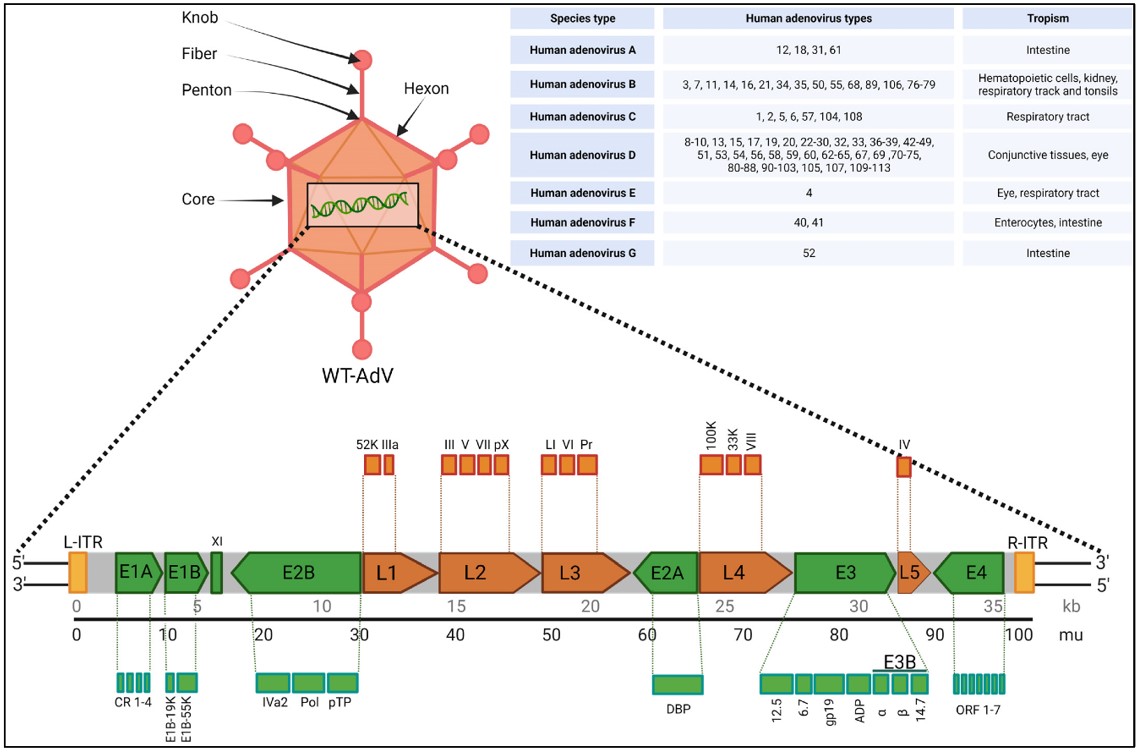
2. “An Inducible ESCRT-III Inhibition Tool to Control HIV-1 Budding”
by Haiyan Wang, Benoit Gallet, Christine Moriscot, Mylène Pezet, Christine Chatellard, Jean-Philippe Kleman, Heinrich Göttlinger, Winfried Weissenhorn and Cécile Boscheron
Viruses 2023, 15(12), 2289; https://doi.org/10.3390/v15122289
Available online: https://www.mdpi.com/1999-4915/15/12/2289
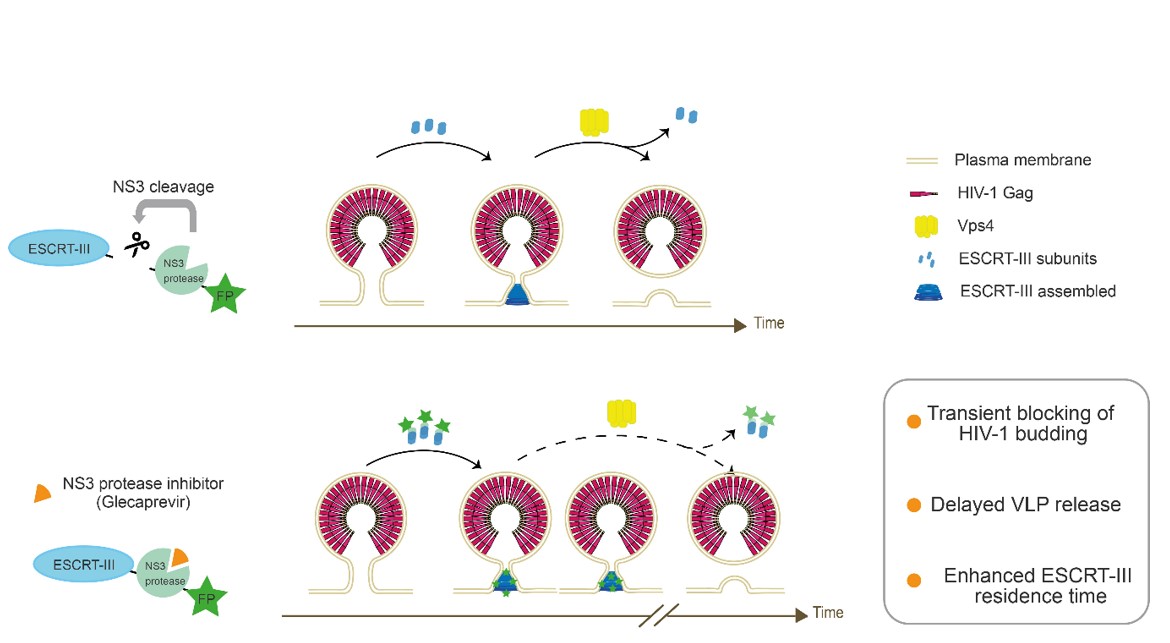
3. “The Circulating miRNA Profile of Chronic Hepatitis D and B Patients Is Comparable but Differs from That of Individuals with HBeAg-Negative HBV Infection”
by Daniela Cavallone, Eric David B. Ornos, Gabriele Ricco, Filippo Oliveri, Barbara Coco, Piero Colombatto, Laura De Rosa, Leslie Michelle M. Dalmacio, Ferruccio Bonino and Maurizia Rossana Brunetto
Viruses 2023, 15(11), 2257; https://doi.org/10.3390/v15112257
Available online: https://www.mdpi.com/1999-4915/15/11/2257
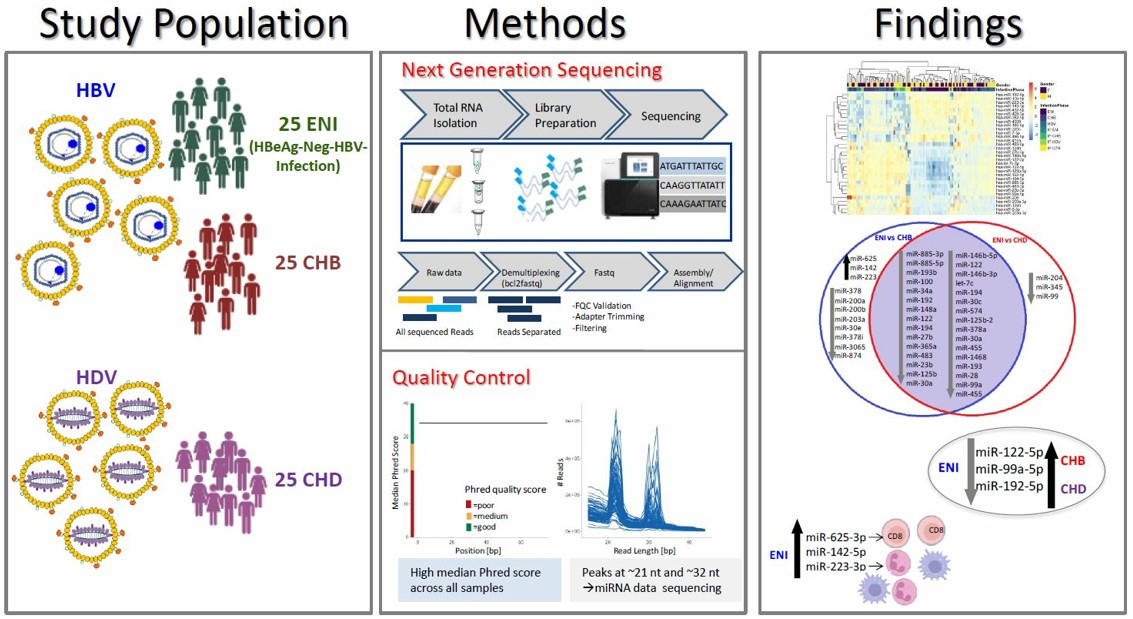
4. “SIV Infection Regulates Compartmentalization of Circulating Blood Plasma miRNAs within Extracellular Vesicles (EVs) and Extracellular Condensates (ECs) and Decreases EV-Associated miRNA-128”
by Steven Kopcho, Marina McDew-White, Wasifa Naushad, Mahesh Mohan and Chioma M. Okeoma
Viruses 2023, 15(3), 622; https://doi.org/10.3390/v15030622
Available online: https://www.mdpi.com/1999-4915/15/3/622
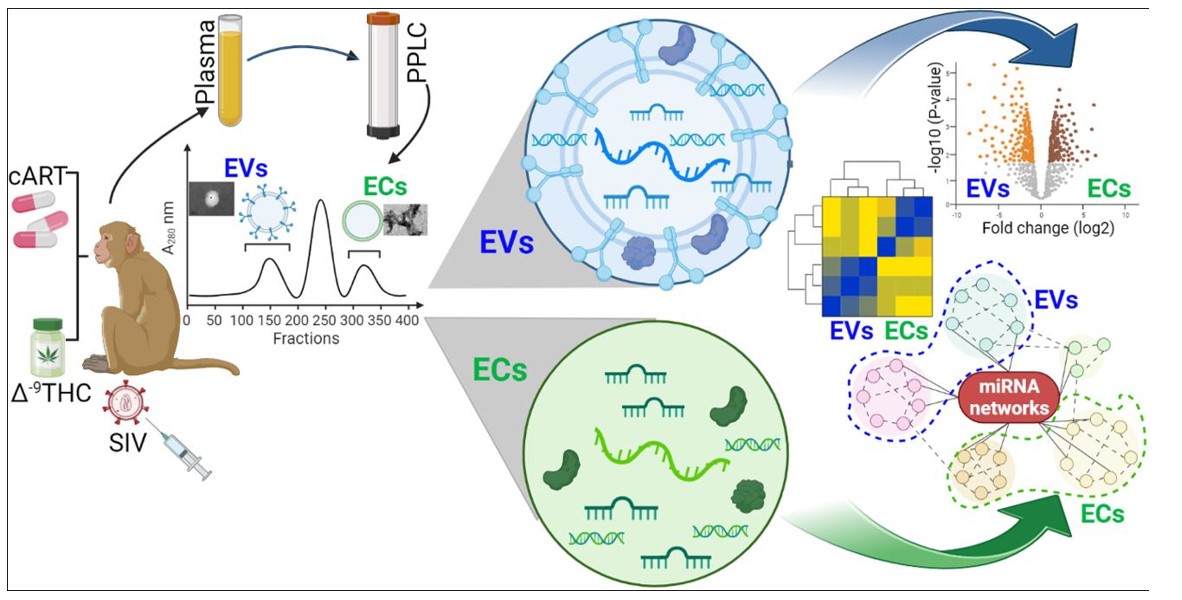
5. “SARS-CoV-2 Causes Lung Inflammation through Metabolic Reprogramming and RAGE”
by Charles N. S. Allen, Maryline Santerre, Sterling P. Arjona, Lea J. Ghaleb, Muna Herzi, Megan D. Llewellyn, Natalia Shcherbik and Bassel E. Sawaya
Viruses 2022, 14(5), 983; https://doi.org/10.3390/v14050983
Available online: https://www.mdpi.com/1999-4915/14/5/983
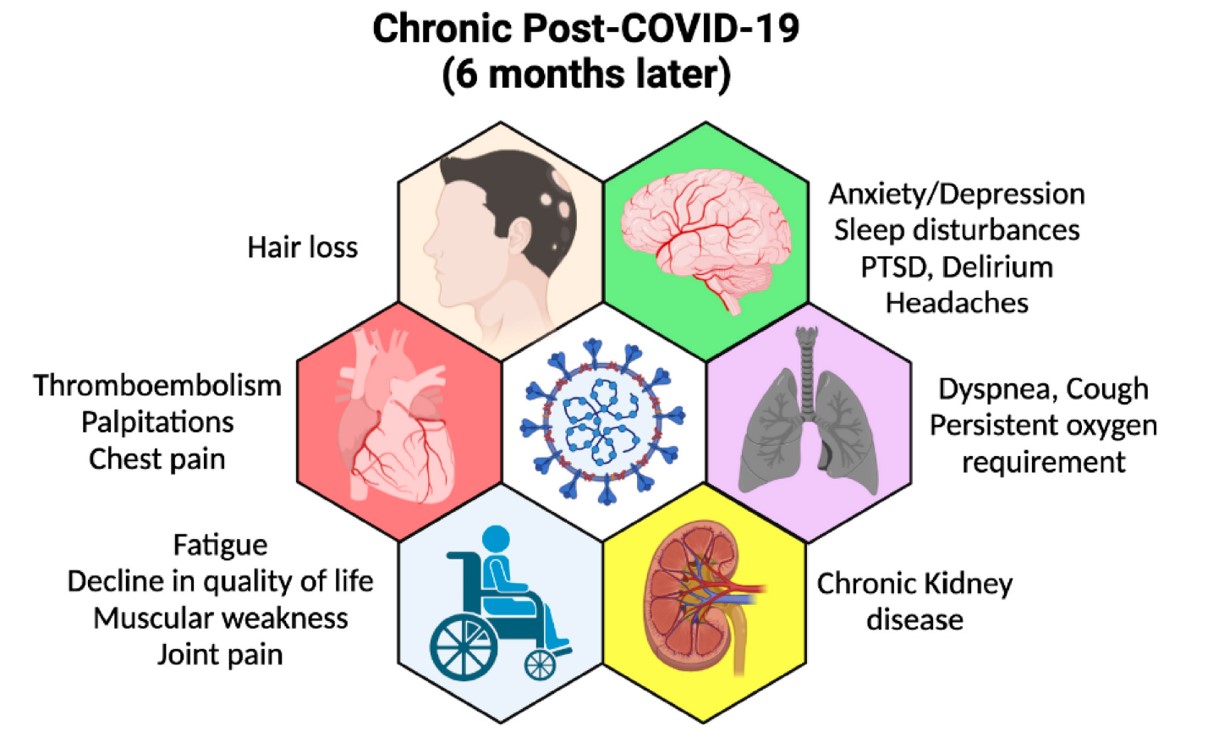
14 June 2024
Viruses | Selected Papers in the Section “Animal Viruses”
by Velmurugan Balaraman, Sabarish V. Indran, Yonghai Li, David A. Meekins, Laxmi U. M. R. Jakkula, Heidi Liu, Micheal P. Hays, Jayme A. Souza-Neto, Natasha N. Gaudreault, Philip R. Hardwidge et al.
Viruses 2023, 15(11), 2251; https://doi.org/10.3390/v15112251
Available online: https://www.mdpi.com/1999-4915/15/11/2251
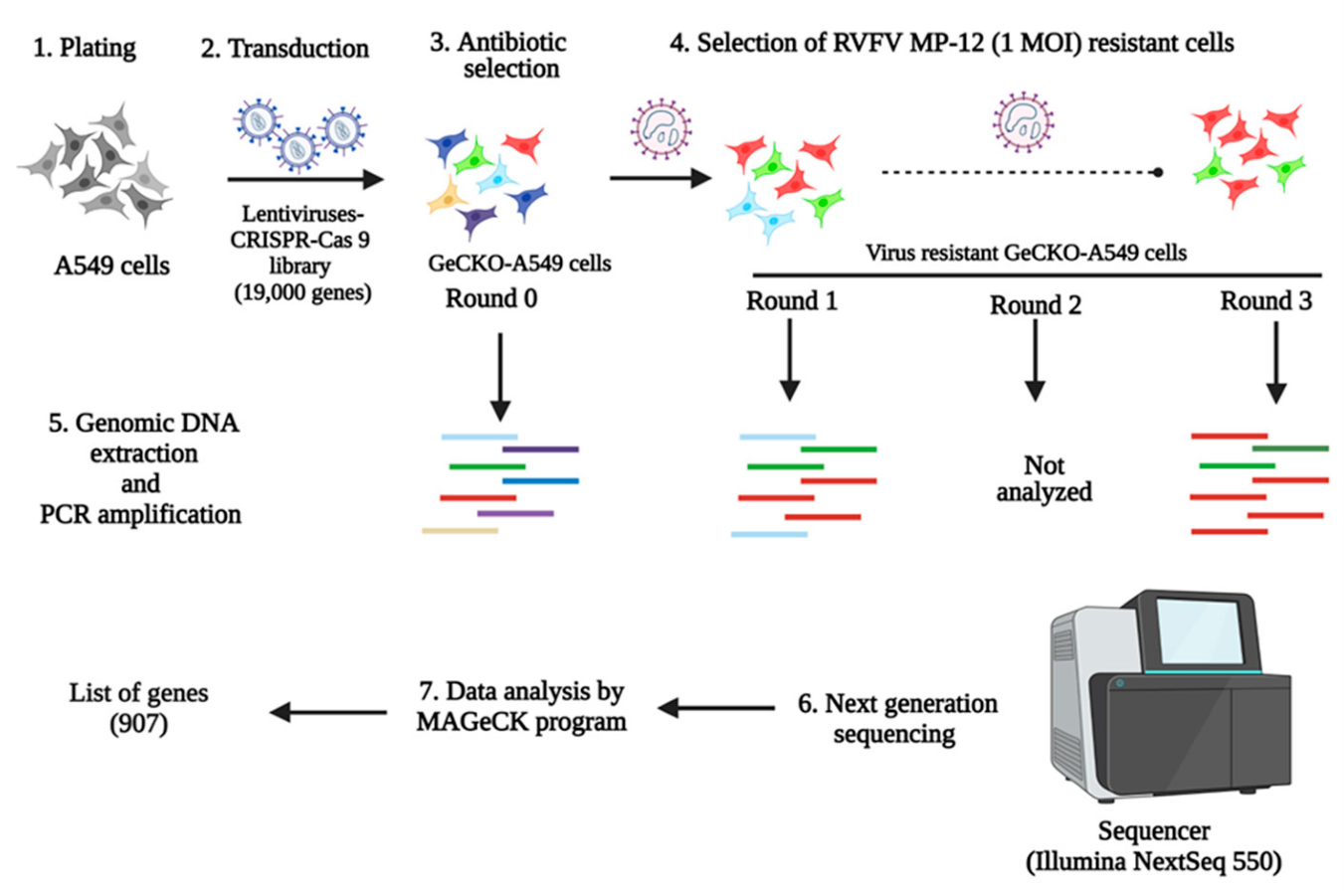 2. “A Triple Gene-Deleted Pseudorabies Virus-Vectored Subunit PCV2b and CSFV Vaccine Protect Pigs against a Virulent CSFV Challenge”
2. “A Triple Gene-Deleted Pseudorabies Virus-Vectored Subunit PCV2b and CSFV Vaccine Protect Pigs against a Virulent CSFV Challenge”
by Ediane Silva, Elizabeth Medina-Ramirez, Selvaraj Pavulraj, Douglas P. Gladue, Manuel Borca and Shafiqul I. Chowdhury
Viruses 2023, 15(11), 2143; https://doi.org/10.3390/v15112143
Available online: https://www.mdpi.com/1999-4915/15/11/2143
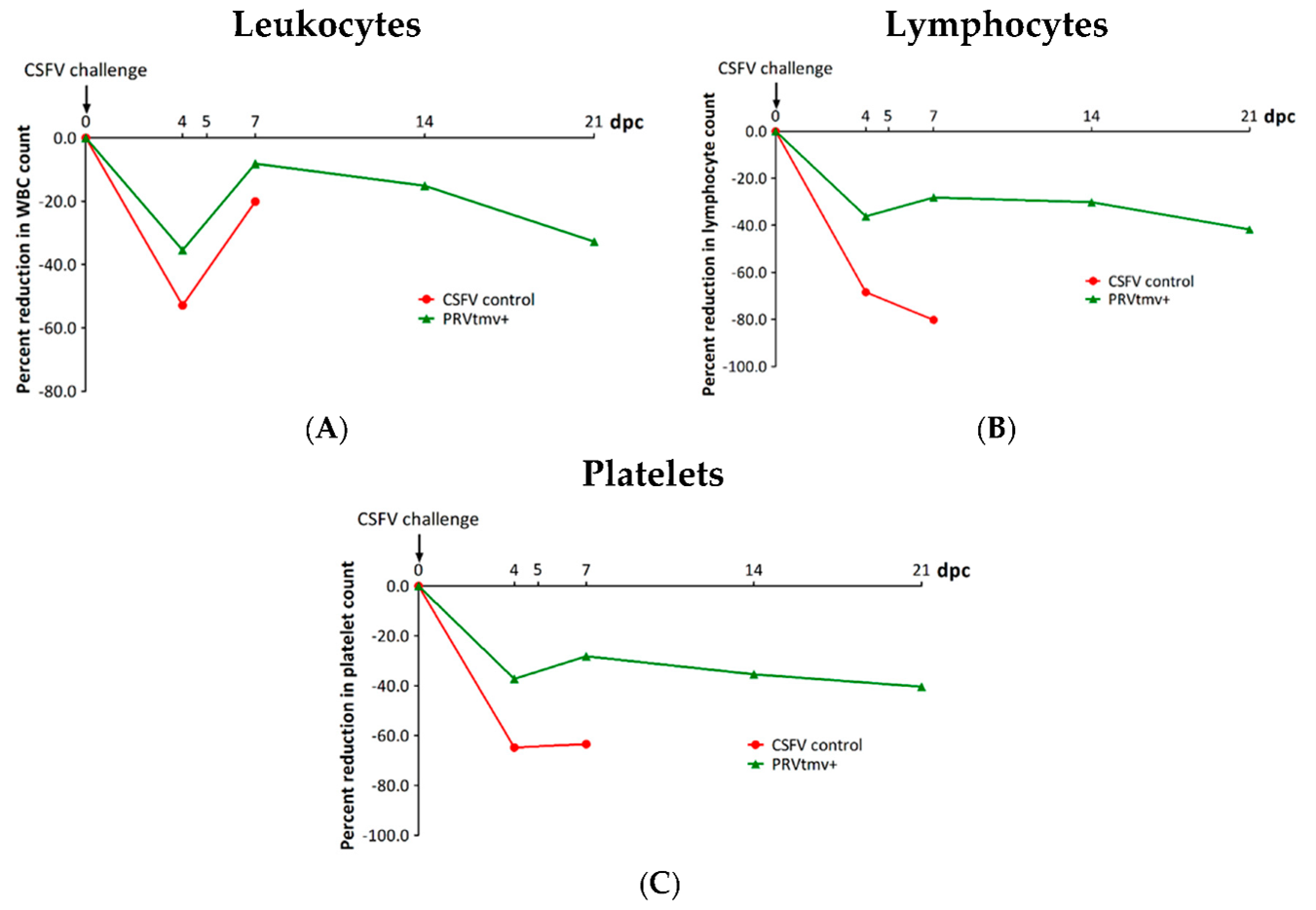 3. “A Candidate Antigen of the Recombinant Membrane Protein Derived from the Porcine Deltacoronavirus Synthetic Gene to Detect Seropositive Pigs”
3. “A Candidate Antigen of the Recombinant Membrane Protein Derived from the Porcine Deltacoronavirus Synthetic Gene to Detect Seropositive Pigs”
by Francisco Jesus Castañeda-Montes, José Luis Cerriteño-Sánchez, María Azucena Castañeda-Montes, Julieta Sandra Cuevas-Romero and Susana Mendoza-Elvira
Viruses 2023, 15(5), 1049; https://doi.org/10.3390/v15051049
Available online: https://www.mdpi.com/1999-4915/15/5/1049
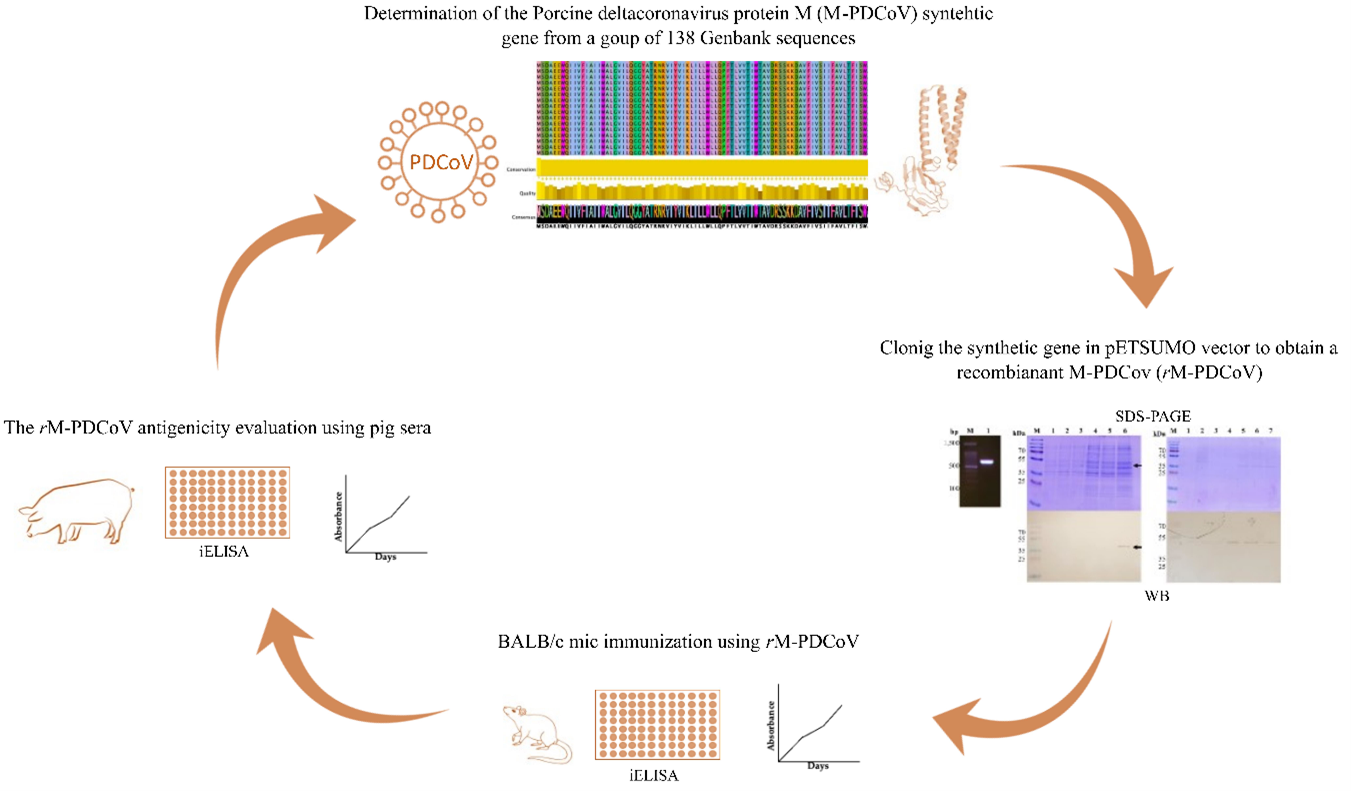 4. “Development of a Pan-Filoviridae SYBR Green qPCR Assay for Biosurveillance Studies in Bats”
4. “Development of a Pan-Filoviridae SYBR Green qPCR Assay for Biosurveillance Studies in Bats”
by Jessica Coertse, Marinda Mortlock, Antoinette Grobbelaar, Naazneen Moolla, Wanda Markotter and Jacqueline Weyer
Viruses 2023, 15(4), 987; https://doi.org/10.3390/v15040987
Available online: https://www.mdpi.com/1999-4915/15/4/987
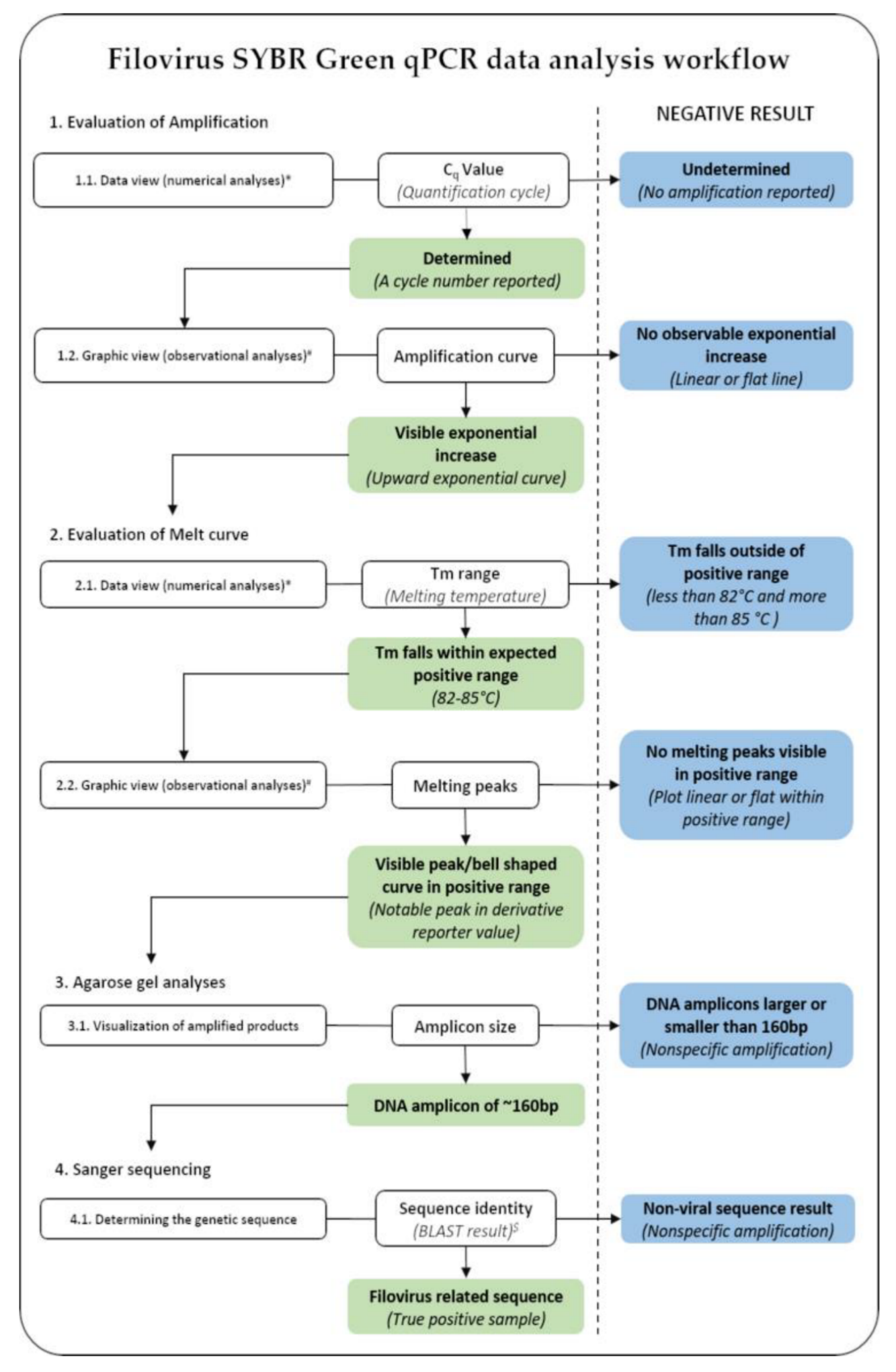 5. “Associations between NK Cells in Different Immune Organs and Cellular SIV DNA and RNA in Regional HLADR− CD4+ T Cells in Chronically SIVmac239-Infected, Treatment-Naïve Rhesus Macaques”
5. “Associations between NK Cells in Different Immune Organs and Cellular SIV DNA and RNA in Regional HLADR− CD4+ T Cells in Chronically SIVmac239-Infected, Treatment-Naïve Rhesus Macaques”
by Xinjie Li, Liyan Zhu, Yue Yin, Xueying Fan, Linting Lv, Yuqi Zhang, Yijin Pan, Yangxuanyu Yan, Hua Liang, Jing Xue and Tao Shen
Viruses 2022, 14(11), 2513; https://doi.org/10.3390/v14112513
Available online: https://www.mdpi.com/1999-4915/14/11/2513
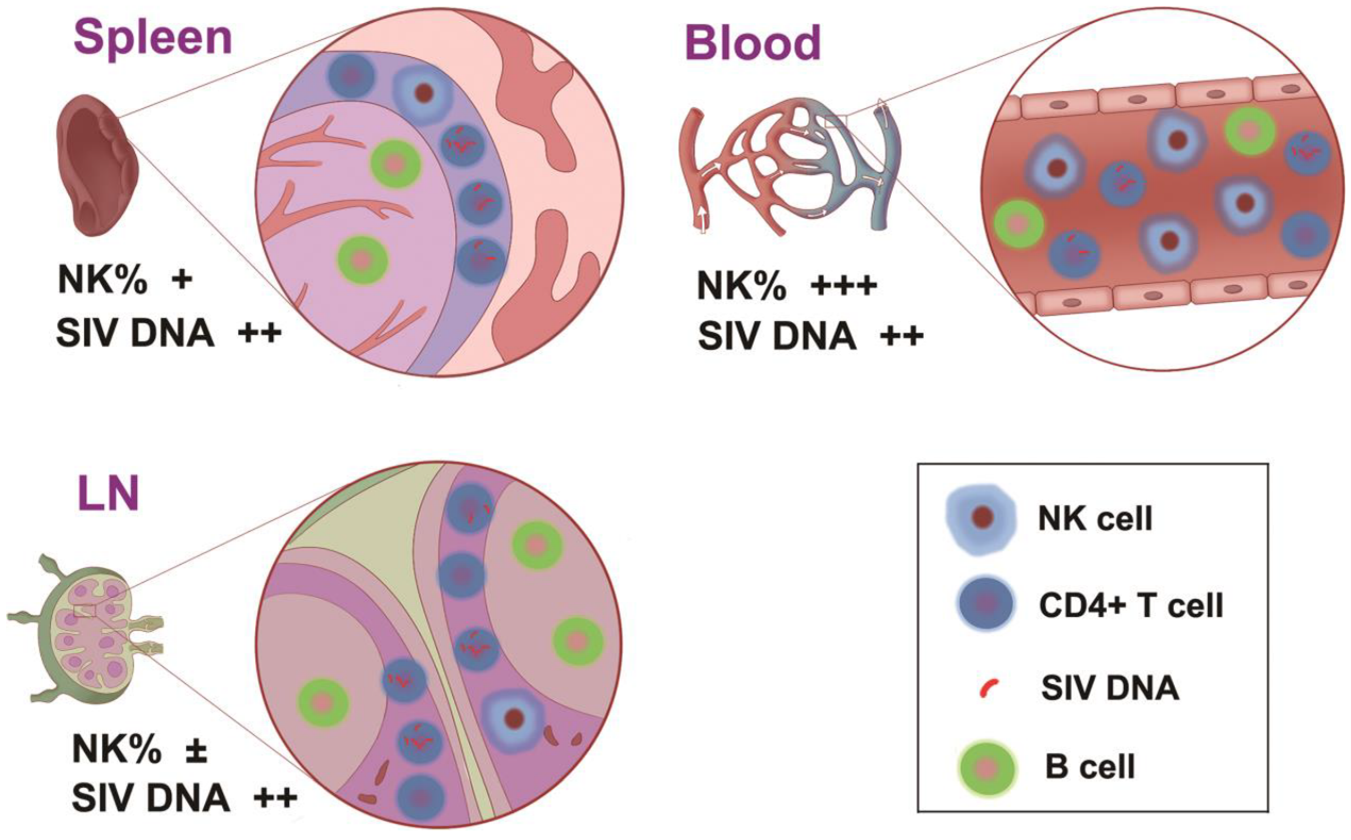
13 June 2024
Viruses Receives an Increased CiteScore of 7.3
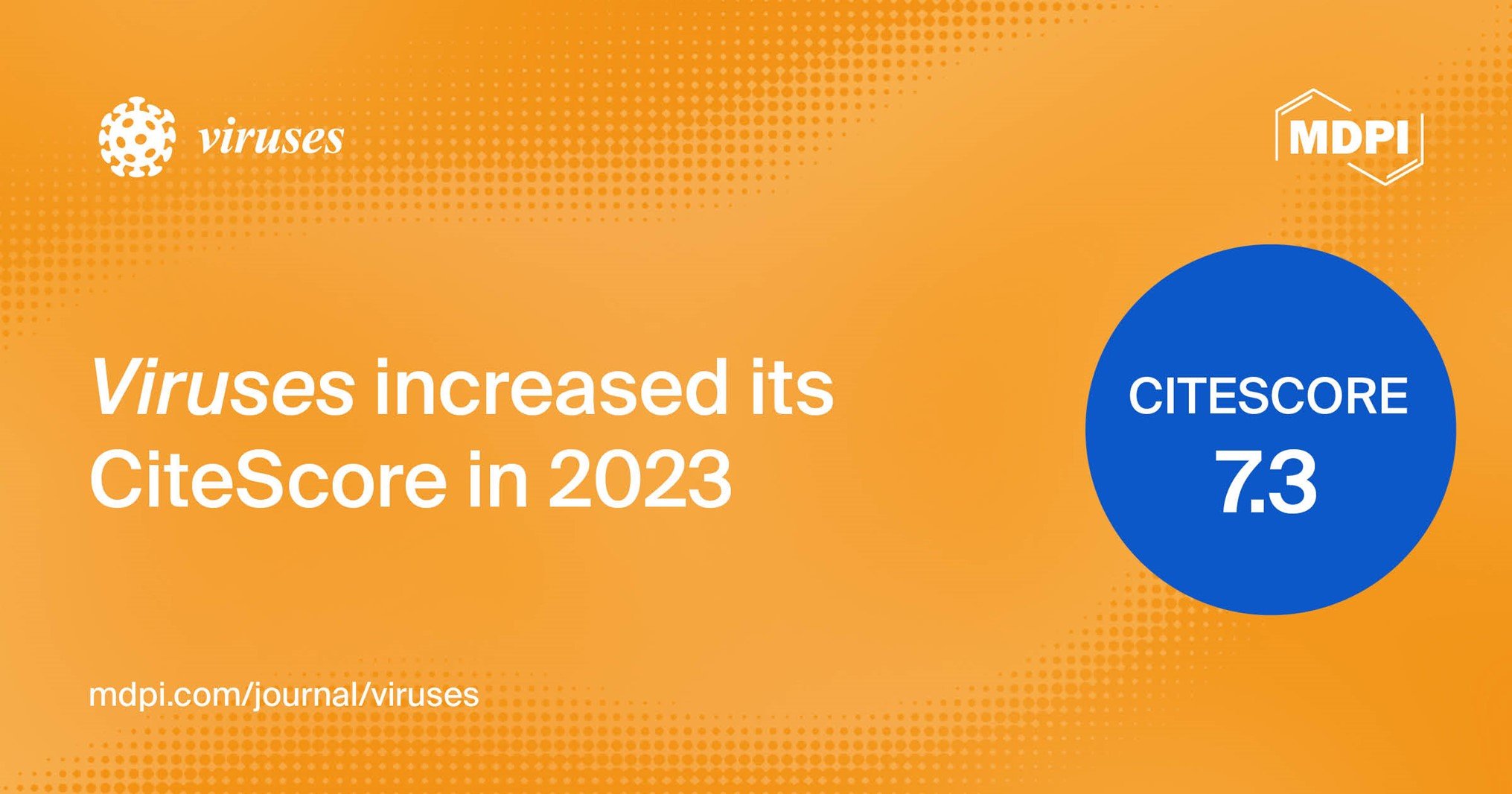
We are thrilled to announce that the 2023 CiteScore of Viruses (ISSN: 1999-4915), reflecting the journal’s scientific influence in the 2020–2023 period, has increased to 7.3, surpassing our 2022 score of 7.1.
CiteScore is a standard citation metric, alongside SNIP and SJR, providing transparent metrics that provide an up-to-date view of a journal’s impact and enable well-informed publishing strategies, library collection development, and the benchmarking of journal performance.
This achievement is, therefore, a testament to the excellent performance, support, and dedication of all our journal’s editors, reviewers, authors, and readers.
Viruses’ CiteScore ranks Q1 in the “Infectious Diseases” category and Q2 in the “Virology” category.
For more journal statistics, please visit https://www.mdpi.com/journal/viruses/stats.
We extend our gratitude to everyone who played a role in Viruses reaching this milestone.
Viruses Editorial Office
11 June 2024
Editor-in-Chief Dr. Eric O. Freed Attends the Cold Spring Harbor 2024 Retroviruses Meeting
The esteemed Editor-in-Chief of our journal Viruses (ISSN: 1999-4915), Dr. Eric O. Freed, recently attended the Cold Spring Harbor 2024 Retroviruses meeting. During the event, he delivered the keynote address, entitled “Uncovering the mysteries of HIV replication (or trying to)”.
You can find the complete lecture at the following link: https://leadingstrand.cshl.edu/Keynote/Media/2024/RETRO/691
7 June 2024
MDPI Calls for Greater Open Access to Science for Ocean Protection
On UNESCO’s 2024 Oceans Day, MDPI encourages the scientific community to increase the accessibility of ocean research to accelerate ocean conservation.
Basel, Switzerland, June 7, 2024: MDPI, a leading open access (OA) publisher, is proud to announce its active support for World Oceans Day 2024, celebrated under UNESCO’s Ocean Decade framework. MDPI’s CEO, Stefan Tochev hopes that “the latest ocean research can be made freely accessible to help empower scientists and communities at large to save our oceans,” under UNESCO’s Ocean Decade until 2030.
Open Access: A Catalyst for Ocean Action
MDPI’s presence at the UNESCO Ocean Decade Conference 2024 highlights our unwavering commitment to using OA to advance ocean science, support research communities, and promote sustainable ocean management.
"Our involvement in the UNESCO Ocean Decade Conference underscores MDPI's commitment to the underfunded Ocean SDG. By promoting OA to scientific articles and books on SDGs, we aim to inspire critical actions," said Tochev. "Our initiatives, like the World Sustainability Award and Emerging Sustainability Award, further demonstrate our dedication to advancing sustainability.”
Showcasing MDPI’s Contributions to Ocean Research
Over the past three years, MDPI has published 30,000 papers focused on ocean research and related topics. Key MDPI journals contributing to this body of work include:
- Journal of Marine Science and Engineering (4.9k papers)
- Remote Sensing (2.6k papers)
- Sustainability (2k papers)
- International Journal of Molecular Sciences (IJMS) (1.7k papers)
- Marine Drugs (1.5k papers)
- Water (1.5k papers)
These publications highlight MDPI’s contributions to ocean science, reinforcing our role in the broader sustainability agenda by promoting blue innovation and economy.
Additionally, MDPI has launched Oceans, an international, peer-reviewed forum specifically aimed at publishing studies related to all branches of oceanography with an emphasis on the functioning of the ocean and the sustainable use of its resources and ecosystem services.
Affirming MDPI’s Commitment to Ocean Science
MDPI’s commitment to OA is pivotal in addressing critical global challenges, from climate change to ocean sustainability. Our efforts resonate with Outcome 4 of the UNESCO Ocean Decade action roadmap: an accessible ocean with open and equitable access to data, information, technology, and innovation. By aligning with UNESCO’s goals, MDPI continues to contribute to shaping a sustainable future for our oceans, reinforcing our position as a forward-thinking publisher dedicated to environmental stewardship and scientific excellence.
For more information, contact Rui Duarte at rui.duarte@mdpi.com or +41764313242.
About MDPI
A pioneer in scholarly, open access publishing, MDPI has supported academic communities since 1996. MDPI is leading the transition to open science by making more research free and accessible to everyone. Over 3.5 million researchers have entrusted MDPI with publishing their scientific discoveries. MDPI’s editorial process is bolstered by a network of dedicated reviewers, a team of over 6000 professional, well-trained staff members, and an in-house article submission platform that was designed to ensure efficient processes within its 430 fully open access titles.
5 June 2024
MDPI Sets a New Benchmark for Publishing Excellence
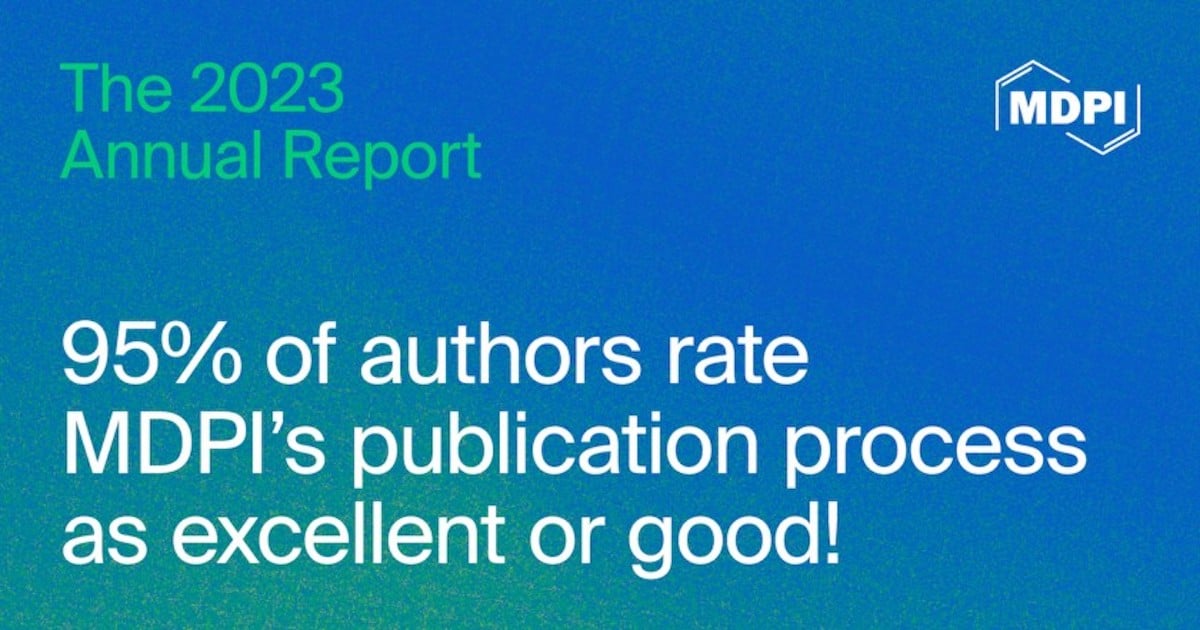
95% of authors rate MDPI’s publication process as excellent or good, setting a new benchmark in scientific publishing – reveals 2023 Annual Report.
Basel, Switzerland, June 4, 2024: MDPI, the leading open access (OA) publisher, proudly announces the release of its 2023 Annual Report, detailing remarkable achievements and reaffirming its leadership in advancing OA publishing. In 2023, MDPI received 655,065 submissions, of which 285,244 articles were published. The company now commands a 17% market share in gold open access articles, with a median publication time of six weeks.
Stefan Tochev, MDPI's CEO, stated, "As a pioneer in open access publishing, MDPI has long been a game-changer in the scholarly community, serving millions of authors around the world to ensure the latest research is freely available. Reflecting on our incredible journey at MDPI, 2023 has been marked by growth in paper submissions, ambitious projects and initiatives aimed at improving our internal processes and delivering top-notch services to our scientists."
MDPI's 2023 Annual Report highlights several key achievements:
- 17% market share in gold open access articles across all disciplines.
- Record satisfaction rates: 95% of authors, 82% of reviewers, and 85% of guest editors.
- Enhanced editorial standards and feedback processes.
- Increased reach and impact with 54 new MDPI journal inclusions in Scopus, 29 in Web of Science, and 77 in DOAJ.
MDPI’s unwavering commitment to advancing OA has transformed the landscape of scholarly publishing, making high-quality research freely accessible to the global scientific community. The continuous improvement in our editorial standards and feedback processes underscores MDPI’s dedication to ensuring academic integrity and excellence.
Global Reach and Collaboration
MDPI’s global footprint continues to expand, with authors from diverse regions: 37% from Asia/Pacific, 36% from Europe, 15% from the Americas, and 12% from other parts of the world. The company’s fully OA platform attracted nearly 14 million monthly visitors in 2023, reflecting its widespread influence in the scientific community.
Commitment to Partnerships
With over 800 institutional partners, MDPI continues to demonstrate its dedication to providing reliable and collaborative publishing services. The introduction of a transparent flat-fee model highlights MDPI's ongoing efforts to enhance affordability and support to the academic community. For more details read our 2023 Annual Report.
For more information, contact Rui Duarte at rui.duarte@mdpi.com or +41764313242.
About MDPI
A pioneer in scholarly, open access publishing, MDPI has supported academic communities since 1996. MDPI is leading the transition to open science by making more research free and accessible to everyone. Over 3.5 million researchers have entrusted MDPI with publishing their scientific discoveries. MDPI’s editorial process is bolstered by a network of dedicated reviewers, a team of over 6000 professional, well-trained staff members, and an in-house article submission platform that was designed to ensure efficient processes within its 430 fully open access titles.




